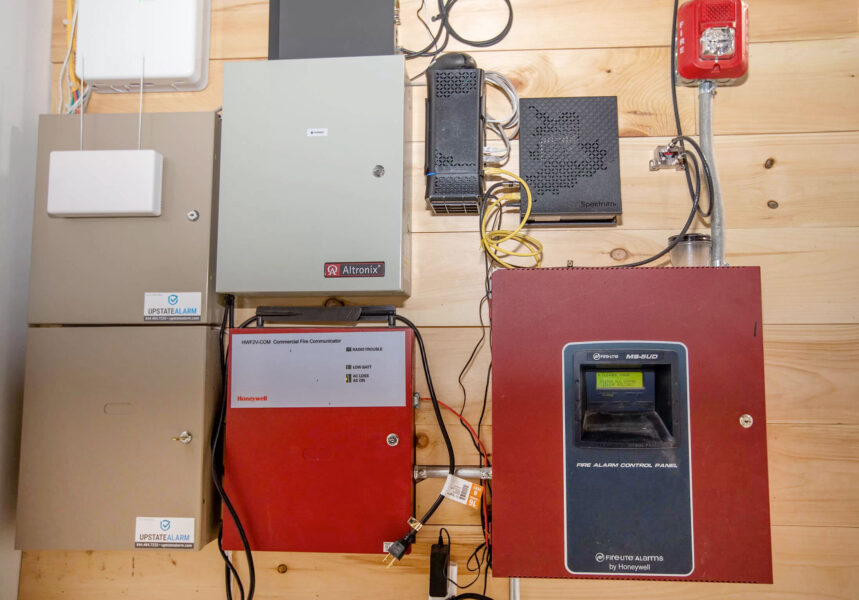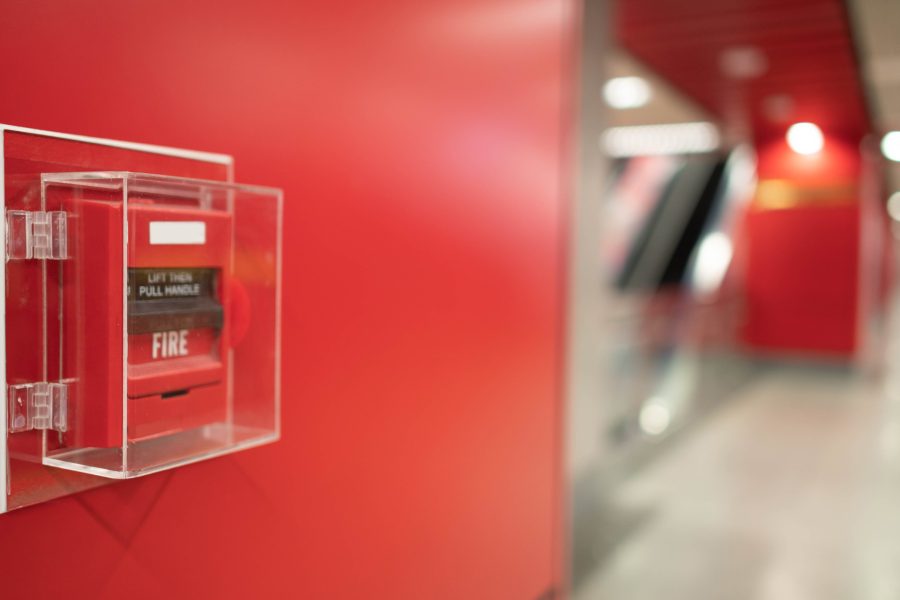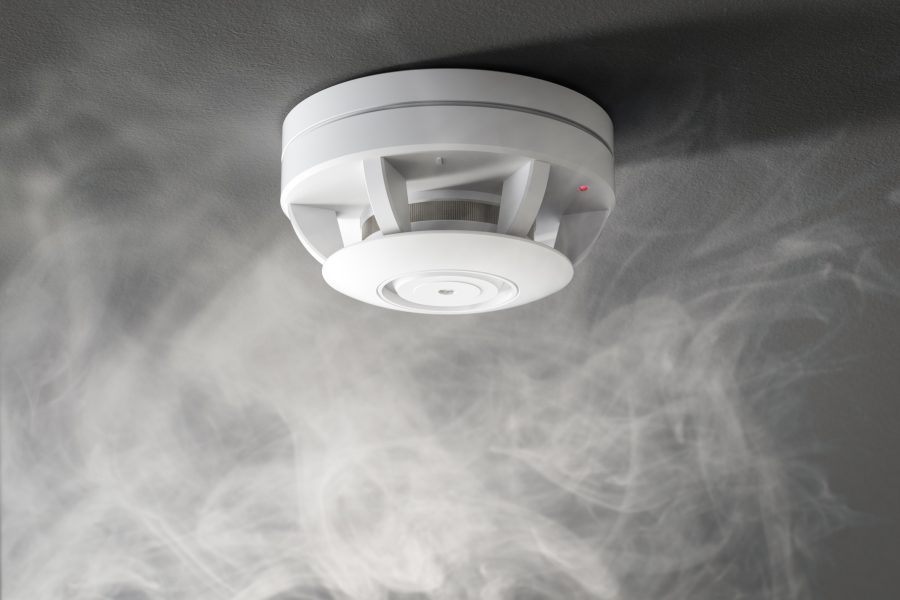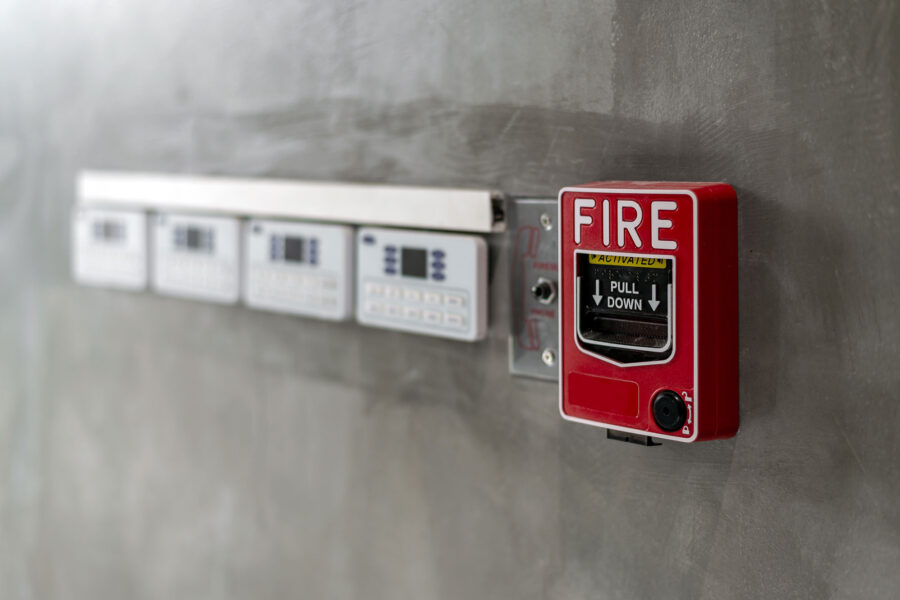Welcome to Douglas Electric’s comprehensive guide on commercial fire alarms. In today’s fast-paced commercial environments, the safety of employees, customers, and valuable assets is of paramount importance. One critical aspect of ensuring safety is the installation of an efficient commercial fire alarm system. With its ability to detect and alert occupants about potential fire hazards, a commercial fire alarm system acts as a reliable safeguard against devastating fires. In this article, we will explore the importance of commercial fire alarm systems, the various types available for commercial buildings, the key components that make up these systems, and delve into how they work to protect lives and property. Let’s dive in and uncover the inner workings of commercial fire alarm systems.

Why Is a Commercial Fire Alarm System Important?
Commercial fire alarm systems play a pivotal role in safeguarding businesses, employees, and customers. Here are a few reasons why these systems are essential:
- Early Fire Detection: Commercial fire alarm systems are designed to detect fires at their inception. Early detection allows for a quick response, increasing the chances of extinguishing the fire before it spreads and minimizing potential damage.
- Occupant Safety: By promptly alerting occupants to a fire emergency, commercial fire alarm systems provide vital evacuation instructions, ensuring the safety of everyone present in the building.
- Property Protection: Fires can cause significant damage to commercial properties, resulting in financial losses and business interruptions. A reliable fire alarm system helps mitigate these risks by facilitating immediate action, such as notifying emergency services and initiating suppression systems.
- Code Compliance: Many jurisdictions and insurance companies require commercial buildings to have fire alarm systems installed to meet safety standards and regulations. Compliance with these codes not only ensures the safety of occupants but also avoids penalties and potential legal liabilities.
What Are the Types of Fire Alarm Systems for Commercial Buildings?
Several types of fire alarm systems are suitable for commercial buildings, each designed to meet specific needs. The most common types include:
- Conventional Fire Alarm Systems: These systems divide a building into zones, allowing users to identify the general area where a fire has been detected.
- Addressable Fire Alarm Systems: Offering more precise information, addressable systems can pinpoint the exact location of a fire or fault within a building.
- Wireless Fire Alarm Systems: Ideal for retrofitting or locations where wiring is challenging, wireless systems provide reliable communication between devices without the need for physical connections.
- Aspiration Smoke Detection Systems: Employing advanced technology, aspiration systems actively sample air to detect smoke particles, providing early warning in sensitive areas.
- Analog/Intelligent Fire Alarm Systems: Analog or intelligent fire alarm systems offer the highest level of sophistication and flexibility. They continuously monitor the environment and analyze data to detect the early signs of a fire. These systems can differentiate between false alarms and genuine emergencies, minimizing disruptions while ensuring the highest level of safety.
Choosing the right type of fire alarm system depends on factors such as the building’s size, layout, occupancy, and specific requirements.
What Are the Parts of Commercial Fire Alarms?
Commercial fire alarm systems consist of various components that work together to detect, alert, and respond to fire emergencies. Here are the essential parts of a typical commercial fire alarm system:
- Fire Alarm Control Panel (FACP): The central hub of the system, the FACP monitors inputs from smoke detectors, heat detectors, and other devices, and initiates appropriate actions based on the received information.
- Smoke Detectors: These devices sense the presence of smoke particles in the air and trigger the alarm.
- Heat Detectors: Heat detectors monitor the ambient temperature and activate the alarm if it exceeds a predetermined threshold.
- Manual Pull Stations: Located at strategic points, these stations allow occupants to manually trigger the alarm system in case of a fire.
- Notification Devices: These devices include horns, strobes, and speakers that emit audible and visual signals to alert occupants and aid evacuation.
- Duct Smoke Detectors: Installed in HVAC systems, these detectors sense smoke in air ducts, preventing the spread of smoke throughout the building.
- Sprinkler Systems: While not directly part of the fire alarm system, sprinklers are often integrated with alarms to suppress or control fires.
By working together, these components create a robust network of fire detection and notification, enhancing the overall safety of the premises.
How Do Commercial Fire Alarms Work?
Commercial fire alarms operate on a simple yet efficient principle: detect the presence of smoke, heat, or other signs of fire and promptly alert the occupants and relevant authorities. Here’s a step-by-step breakdown of how these systems work:
- Detection: Smoke detectors or heat detectors continuously monitor the surrounding environment for potential signs of fire. When smoke particles or excessive heat are detected, they send a signal to the fire alarm control panel.
- Alert: Upon receiving the signal, the control panel evaluates the information and triggers the alarm. Simultaneously, notification devices such as horns, strobes, or speakers are activated to alert building occupants.
- Evacuation: The audible and visual alarms alert people within the building to evacuate immediately. Clear and well-marked evacuation routes, along with regular fire drills, contribute to a swift and orderly evacuation.
- Communication: In many cases, commercial fire alarm systems are connected to a monitoring station or emergency services. Once the alarm is triggered, the system automatically notifies the appropriate authorities, facilitating a rapid emergency response.
- Suppression: If the building is equipped with a sprinkler system, the fire alarm system can also activate it to control or extinguish the fire, limiting its spread and minimizing damage.
The effectiveness of a commercial fire alarm system lies in its ability to detect fires early, raise immediate alarms, and facilitate swift evacuation and response.
How Do Fire Alarm Systems Detect a Fire?
Commercial fire alarm systems use various technologies to detect the presence of a fire. The two primary methods employed are:
- Smoke Detection: Smoke detectors are the most common type of fire detection device. They employ optical, ionization, or photoelectric technology to identify the presence of smoke particles in the air. When smoke enters the detection chamber, it interrupts a light beam or causes a change in electrical conductivity, triggering the alarm.
- Heat Detection: Heat detectors are designed to sense excessive heat or rapid temperature rise, signaling the presence of a fire. They can be classified into two types: fixed temperature detectors, which activate when a specific temperature threshold is reached, and rate-of-rise detectors, which trigger the alarm if the temperature rises rapidly within a short period.
By using these detection methods, commercial fire alarm systems provide early warning of a fire, allowing occupants to evacuate promptly and minimizing the risk of injuries or fatalities.
How Are Commercial Fire Alarms Monitored?
To ensure the continuous functionality of commercial fire alarm systems, many businesses opt for professional monitoring services. Here’s how the monitoring process typically works:
- Connection: The fire alarm system is connected to a monitoring station via telephone lines, cellular networks, or the internet.
- 24/7 Surveillance: The monitoring station operates around the clock, monitoring the signals received from the fire alarm system. Trained professionals are always ready to respond to any emergencies.
- Immediate Response: When an alarm is triggered, the monitoring station quickly assesses the situation and contacts the appropriate authorities, such as the fire department, to dispatch emergency services to the location.
- System Maintenance: Monitoring services often include regular system maintenance, ensuring that the fire alarm system is functioning optimally at all times.
Are Smoke Detectors and Fire Alarm Systems the Same?
Smoke detectors are an integral part of fire alarm systems, but they are not the same. While smoke detectors focus on the detection of smoke particles, fire alarm systems encompass a broader range of components and functions. Fire alarm systems integrate multiple devices, such as heat detectors, control panels, and notification devices, to detect fires, raise alarms, and facilitate emergency response.
Smoke detectors work in conjunction with other components within a fire alarm system to detect fires and activate the necessary notifications. They provide an essential early warning, allowing occupants to evacuate promptly and enabling the system to trigger the appropriate emergency response protocols.
Commercial Fire Alarm Compliance Standards
Compliance with fire safety standards is of utmost importance for commercial buildings. Failure to adhere to these standards not only poses significant risks but may also result in legal consequences. Here are some key compliance standards that govern commercial fire alarm systems:
- National Fire Protection Association (NFPA) Standards: The NFPA sets forth guidelines and codes for fire alarm systems, including installation, maintenance, and testing procedures.
- International Building Code (IBC): The IBC outlines the minimum requirements for building design and construction, including fire alarm system specifications.
- Local Building Codes: Each jurisdiction may have specific building codes that govern fire safety and the installation of fire alarm systems. It is essential to consult local regulations to ensure compliance.
- Americans with Disabilities Act (ADA): Fire alarm systems must comply with ADA requirements to ensure equal accessibility for individuals with disabilities.
What Is the Estimated Cost of a Commercial Fire Alarm System?
The cost of a commercial fire alarm system can vary significantly depending on factors such as the size of the building, the complexity of the system, and the specific requirements. It is challenging to provide an accurate estimate without considering these variables. However, it’s crucial to view the cost as an investment in safety rather than an expense.
Factors that can influence the cost of a commercial fire alarm system include:
- Building Size: Larger buildings typically require more devices and complex wiring, which can increase the overall cost.
- System Complexity: The type of system chosen, additional features, and integration with other building systems can impact the cost.
- Maintenance and Monitoring: Consider ongoing expenses such as system maintenance, testing, and monitoring services.
- Local Requirements: Local building codes and regulations may impose specific requirements that can influence the cost.
To determine the precise cost of a commercial fire alarm system tailored to your building’s needs, it is recommended to consult with experienced fire alarm system providers like Douglas Electric who can assess your requirements and provide accurate pricing estimates.
Discover More About Commercial Fire Alarm Systems From the Experts at Douglas Electric
At Douglas Electric, we understand the critical importance of commercial fire alarm systems in safeguarding lives and property. As industry experts, we are committed to providing top-notch fire alarm solutions tailored to your specific needs. Our team of knowledgeable professionals is well-versed in the latest fire safety regulations and technologies, ensuring that your commercial building remains protected.
Whether you need assistance with fire alarm system installation, maintenance, monitoring, or compliance, our dedicated team is here to help. Contact Douglas Electric today to discover how we can enhance the safety and security of your commercial premises.
Related Posts

The Cost of Commercial Fire Alarm System Installation: A Comprehensive Guide

Do You Need an Electrician for Smoke Detector Installation?

